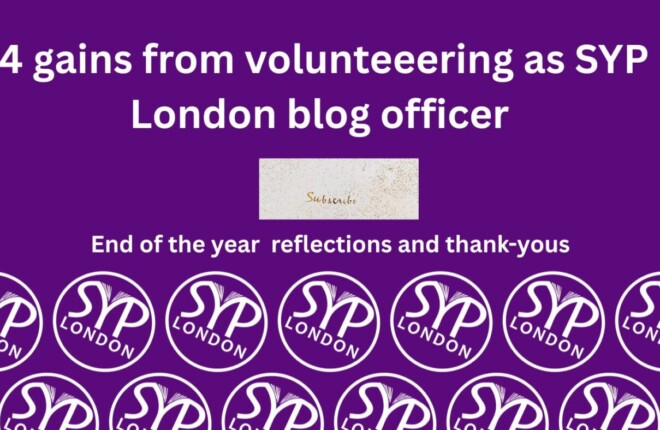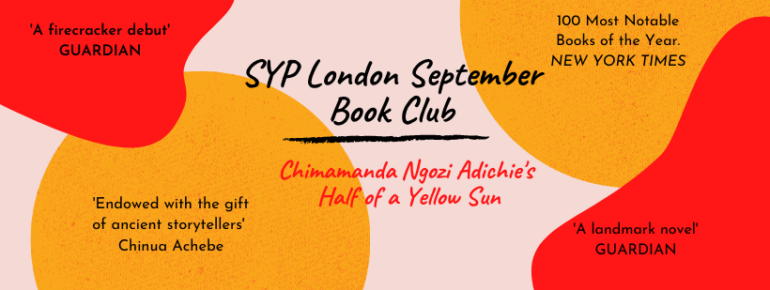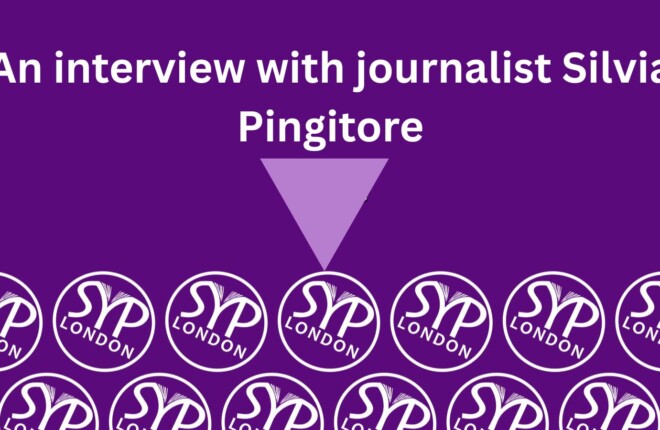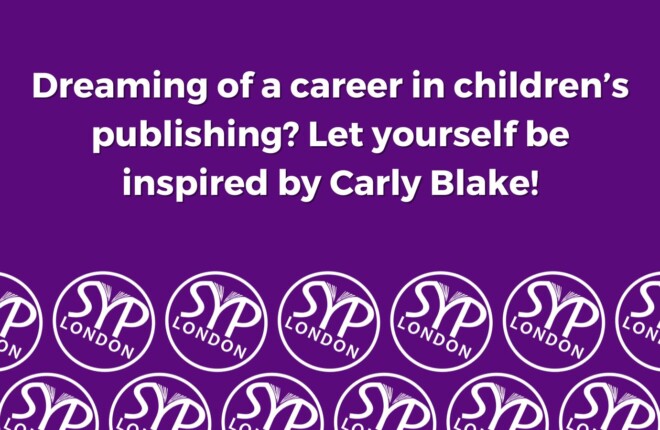
‘Unfamiliar but necessary’: SYP LDN reads Half of a Yellow Sun
Posted on September 11, 2020 in London

Things are a bit weird lately, aren’t they? Or do I mean ‘the new normal’? Who even knows anymore? While some of us are taking tentative steps back towards the Tube, others are firmly fixed behind our computer screens for the foreseeable. There’s really never been a better time to distract yourself from all this madness and dive into a good book. Honestly, thank god for book club!
All of us at SYP LDN cannot wait for the day when we can return to face-to-face book clubs in actual pubs across actual tables with actual people. What a luxury! In the meantime, our virtual Zoom meetups is keeping things interesting with a powerhouse of a book from an author you’ve almost definitely heard of whether it’s through a HUGE number of award ceremonies or maybe a cheeky TEDx talk. We love a TEDx talk. On the 7th September 2020, we gathered around our Zoom screens with a steaming mug of tea/ cheeky glass of wine (delete as appropriate) to discuss Chimamanda Ngozi Adichie’s Half of a Yellow Sun.
Chimamanda Ngozi Adichie has skyrocketed in fame over the last decade. The Nigerian writer who moved to the United States at nineteen won the Commonwealth Writers’ Prize for her novel Purple Hibiscus in 2005, the PEN Beyond Margins Award for Half of a Yellow Sun in 2007, the National Book Critics’ Circle Award for Fiction for Americanah in 2013 and the PEN Pinter Prize in 2018 just to name a few. Now, we get to see why.
“A necessary read!”
“Fantastically written but intense.”
“Unfamiliar and educational.”
The consensus seemed to be that we were all challenged by Chimamanda Ngozi Adichie’s second novel. Published in 2006, Half of a Yellow Sun intertwines the multiple stories of people living through the Nigerian Civil War.
For most of us living in Western countries, our education has been so dramatically whitewashed that many of us knew next to nothing about the war. Actually, it seems like across the world, the devastating effects of the Nigerian Civil War have been underreported. One theory may be that it coincided with the 1967 Summer of Love in the United States and coming to terms with devastation overseas wasn’t the contemporary priority of the Western world. Another is that the UK typically loves to downplay its bad behaviour in previous conflicts. Consequently, the first thing that struck us about Half of a Yellow Sun is its unfamiliarity. Unfamiliarity of history. Unfamiliarity of language. Uncertainty, having to research chunks of history to understand the context, the author’s refusal to translate certain passages. And the fact that that is entirely necessary. We shouldn’t expect an author to map out a story for us in easily digestible historical stepping-stones. We should work for the information. If it’s unfamiliar to us, perhaps we should be looking towards our society and education system and asking why.
Now, SYP London’s September Book Club discusses how Half of a Yellow Sun is both confronting and educational. We discussed the novel’s mystifying way of flitting backwards and forwards in time and the sisterly relationship between twins Olanna and Kainene. We discussed how we felt Richard, a white man, was attempting to justify his presence in the war through his relationship with Kainene and how his fascination with appearing authentic among the Nigerian people was giving us serious Alix and Kelley vibes from last month’s Such a Fun Age. We also discussed the concept of Ugwu, who works as a servant in Odenigbo’s house, and how despite Odenigbo’s socialist ideals, Ugwu reminds us that the class/race intersection persists in Nigerian society.
While some might term it a criticism that many of us agreed we might not re-read Chimamanda Ngozi Adichie’s second novel in a hurry, we agreed it’s a necessary read and we would still recommend it to others.
Might go without saying for a book that deals with war but prepare yourself for some real tear-jerker moments.
And let us know what you think under #SYPLDNBookClub on Twitter and why not join us at our October book club where we’ll be discussing Jeanette Winterson’s Oranges Are Not The Only Fruit.
As ever, keep an eye on our socials for new events and don’t miss our September newsletter dropping into your inboxes soon!
Take care!




 Listen to the podcast
Listen to the podcast  Explore the Youtube channel
Explore the Youtube channel